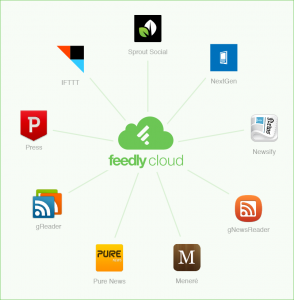aNewDomain.net — As the July 1 planned execution of the much-beloved Google Reader draws near, services vying to replace Google Reader are capitalizing on the demise of a competitor and busily readying new products and services for abandoned RSS customers.
This morning Feedly announced the open availability of Feedly Cloud. With Feedly Cloud, the company is transforming itself from a service into a platform. It is currently processing 35 million feeds and billions of articles daily.
 Feedly offers an API to build robust content applications for developers. And for publishers, Feedly ideally becomes an avenue to continue distribution once Google Reader is dead and gone, execs told aNewDomain.
Feedly offers an API to build robust content applications for developers. And for publishers, Feedly ideally becomes an avenue to continue distribution once Google Reader is dead and gone, execs told aNewDomain.
For users, Feedly will remain a cross-platform service for organizing and reading feeds — but now with easy migration from Google Reader.
Because the API is open, it allows for applications and integration to be built on top of the service.
Feedly announced several such apps — including support for IFTTT. Feedly also unveiled today a web-complete interface. No longer will it require various browser plugins or extensions to work.
And then there’s Digg. Shortly after Google announced back in March its planned July assassination of Google Reader, Digg announced it planned its own RSS reader service.
Earlier this week — that was Monday — Digg posted a major update to the Digg Reader news on its blog. Version 1 of the Digg Reader is ready and will be launched in phases. It’ll be available to anyone who wants it by June 26, execs said.
In the post, Digg talked about the target audience for its first release. An excerpt from the Digg post is below:
Given the compressed time frame for this sprint, we decided early on that we needed to focus on one type of user. We asked ourselves who had most to lose from the shutdown of Google Reader, and the answer was fairly obvious: the power user, the people who depend on the availability, stability, and speed of Reader every day.”
The major focus of the first release is speed, simplicity and ease of importing Google Reader feeds, Digg execs said. It plans frequent updates. It will, execs added, roll out a number of the most-major improvements over the next 60 days.
Based in Ann Arbor Michigan, Mike Olsen is a tech enthusiast, freelance writer and a senior contributor to aNewDoman.net. Follow his stream on Google+ and email him at MikeO@aNewDomain.net.












